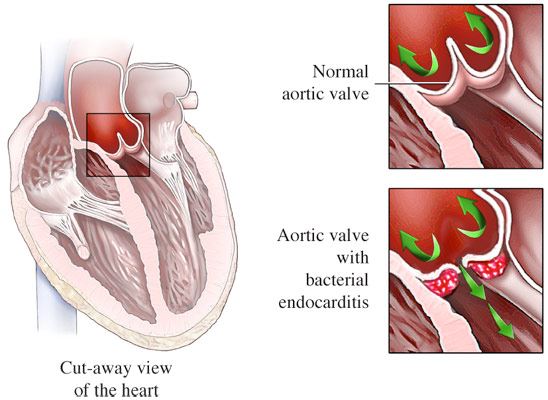Endocarditis
The endocardium is the inner lining of the heart. Endocarditis is an infection of this inner lining. Endocarditis generally occurs when bacteria, fungi or other germs from the environment or another part of your body, such as your mouth, spread through your bloodstream and attach to heart valves. If not treated quickly, endocarditis can damage or destroy your heart valves and lead to life-threatening complications.

Medical Illustration Copyright © 2019 Nucleus Medical Media, All rights reserved.
Types of Endocarditis
- Infectious (Bacterial) Endocarditis: This type of endocarditis is characterized by an infection caused by bacteria or fungi that enter the bloodstream and settle in the heart lining, a heart valve or a blood vessel. This type of endocarditis is uncommon, but people with some heart conditions have a greater risk of developing it.
- Non-Infectious (Non-Bacterial) Endocarditis: This type of endocarditis is characterized by various kinds of illnesses affecting the heart valves, most often the left side of the heart. The disease may be the first step in development of infectious endocarditis.
Causes of Endocarditis
The bacteria that live in your mouth, throat or other parts of your body, such as your skin or your gut, can sometimes cause serious infections like endocarditis. However, other conditions, traits or habits may also raise your risk for the disease. These conditions are known as risk factors and include:
Non-Modifiable Risk Factors: These factors are irreversible and cannot be changed. The more of these risk factors you have, the greater your chance of developing endocarditis.
- Family history/genetics
Modifiable Risk Factors: These factors can be modified, treated or controlled through medications or lifestyle changes.
- Long history of cigarette smoking and/or drug abuse.
- Brushing your teeth or other activities that can cause your gums to bleed.
Other conditions that contribute to developing endocarditis:
- Certain dental procedures
- Contaminated needles
- Infections such as skin sores and sexually transmitted diseases
- Inflammatory bowel disease: A group of disorders that cause chronic inflammation of your digestive tract
- Any type of catheters, including those that stay in your body for a longer period of time such as urinary catheters
Symptoms of Endocarditis
Endocarditis may develop slowly or rapidly depending on what germs are causing the infection, your immunity, and whether you have any underlying heart problems. Endocarditis signs and symptoms can vary from person to person. Common symptoms include:
- Fatigue
- Flu-like symptoms
- Blood in your urine
- Chest pain
- Decreased appetite
- Involuntary weight loss
- Nausea and/or vomiting
- Night sweats
- Shortness of breath
- Swelling in your feet, legs or abdomen
- Enlarged, tender spleen
- Heart murmur
- Enlarged heart
- Other skin manifestations of bacterial endocarditis such as janeway lesions, osler nodes or petechiae.
Diagnosis of Endocarditis
Your doctor may suspect endocarditis based on your medical history, signs and symptoms you're experiencing, and your test results. A diagnosis of endocarditis is usually based on several factors instead of a single positive test result or symptom. Your doctor may also order the following diagnostic test and procedures:
Treatment of Endocarditis
Once endocarditis occurs, quick treatment is necessary to prevent damage to the heart valves and more serious complications such heart failure, and even death. Treatment options include lifestyle changes, medications, and medical and surgical procedures.
Lifestyle Changes
- Avoid smoking.
- Decrease your alcohol or caffeinated beverage consumption.
- Eat a heart-healthy diet.
- Exercise under the directions of your doctor.
- Fluid restriction.
- Make and keep appointments to see your doctor for routine check-ups and follow-up tests.
Medications
- Antibiotics will help treat disease caused by bacteria.
